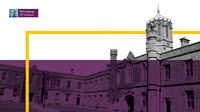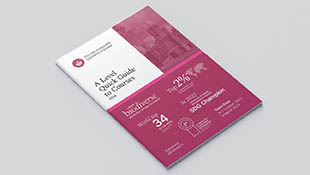-
Courses

Courses
Choosing a course is one of the most important decisions you'll ever make! View our courses and see what our students and lecturers have to say about the courses you are interested in at the links below.
-
University Life

University Life
Each year more than 4,000 choose University of Galway as their University of choice. Find out what life at University of Galway is all about here.
-
About University of Galway

About University of Galway
Since 1845, University of Galway has been sharing the highest quality teaching and research with Ireland and the world. Find out what makes our University so special – from our distinguished history to the latest news and campus developments.
-
Colleges & Schools

Colleges & Schools
University of Galway has earned international recognition as a research-led university with a commitment to top quality teaching across a range of key areas of expertise.
-
Research & Innovation

Research & Innovation
University of Galway’s vibrant research community take on some of the most pressing challenges of our times.
-
Business & Industry

Guiding Breakthrough Research at University of Galway
We explore and facilitate commercial opportunities for the research community at University of Galway, as well as facilitating industry partnership.
-
Alumni & Friends

Alumni & Friends
There are 128,000 University of Galway alumni worldwide. Stay connected to your alumni community! Join our social networks and update your details online.
-
Community Engagement

Community Engagement
At University of Galway, we believe that the best learning takes place when you apply what you learn in a real world context. That's why many of our courses include work placements or community projects.
Bachelor of Science (Computer Science and Information Technology)
Course Overview
We depend on electronic devices, such as computers and mobile phones, computer software and networks to store, process, transmit, retrieve and manipulate information.
Students will cover the technology used in these devices and will focus on the development of the software applications that make these devices useful.
The programme has a flexible course structure, where students can choose to study a range of Next-Generation Technology areas including: Digital Media and Games, Enterprise Informatics, Energy Informatics, Computational Mathematics, Scientific Computing and Medical/ Bio-informatics.
These core subjects provide a solid theoretical and applied background in Computer Science and Information Technology.
Work Placement
As part of this four-year course, students will undertake an eight month (January - August) off-campus work placement in an industrial setting following completion of their thrid year of study. In the event that no external placement is available, students will be given projects on campus. This work experience programme gives students an opportunity to work on projects relevant to their study and significantly improves their chances of obtaining employment after graduation. Read more about Engineering work placements.
Accreditation
All Engineering Degrees at NUI Galway are professionally accredited by the statutory professional body, Engineers Ireland. This “Accreditation” means that the degree has been assessed and approved to meet the educational requirements for professional Engineers.
- Under an international agreement (Washingon Accord), any Degree accredited by the National professional body (Engineers Ireland) is recognized internationally. So having an “Accredited” degree means that employers outside of Ireland can (1) understand the quality/education achieved by a graduate and (2) know that it is equivalent to their own Education system/standards, and (3) can offer appropriate employment on this basis. For example, certain functions (sign off on large civil engineering construction projects) can only be carried out by a chartered engineer.
- Engineers Ireland changed the criteria for Accreditation in 2012, and now require a Masters (Level 9) qualification as the education standard required for Registered Professional Titles of Chartered Engineer* (prior to this, a Level 8 degree was required). The changes were implemented because the standard European engineering qualification (degree or diplome) is at level 9, and European industry maintains a strict differentiation between those engineers qualified at level 9 and those qualified at level 8. Any graduate interested in working in Europe/Worldwide is now strongly advised to get an accredited level 9 award.
- Engineers Ireland accreditation can be obtained at the following levels:
- Level 8: 4-year honours degree – associate engineer
- Level 9: 5-year masters degree – chartered engineer
*A Chartered Engineer is the highest professional education standard in Engineering. A chartered Engineer is competent (because of their education and training) to assume personal responsibility for the development and application ofengineering in research, design, construction, manufacturing, superintending, managing and in the education of the engineer. His/her work is predominantly intellectual and varied and not of a routine mental or physical character. It requires the exercise of original thought and judgement and the ability to supervise the technical and administrative work of others.
Applications and Selections
Who Teaches this Course
Requirements and Assessment
Key Facts
Entry Requirements
Minimum Grade H5 in two subjects and passes in four other subjects at O6/H7 Level in the Leaving Certificate, including Irish, English, Mathematics, and any three other subjects recognised for entry purposes. Students must also obtain a minimum Grade O2 or H6 in Mathematics or alternatively obtain a pass in the Engineering Maths Qualifying Examination (held in the University).
Additional Requirements
For A-Levels a Grade D in A-Level Mathematics or Grade B in O-Level Mathematics is required.
Recognition of Prior Learning (RPL)
Duration
4 year
Next start date
September 2024
A Level Grades (2023)
universityofgalway.ie/alevels
Average intake
65
QQI/FET FETAC Entry Routes
Closing Date
NFQ level
Mode of study
ECTS weighting
Award
Bachelor of Science (Honours) Computer Science and Information Technology
CAO
GY350
Course code
Course Outline
.
Curriculum Information
Curriculum information relates to the current academic year (in most cases).Course and module offerings and details may be subject to change.
Glossary of Terms
- Credits
- You must earn a defined number of credits (aka ECTS) to complete each year of your course. You do this by taking all of its required modules as well as the correct number of optional modules to obtain that year's total number of credits.
- Module
- An examinable portion of a subject or course, for which you attend lectures and/or tutorials and carry out assignments. E.g. Algebra and Calculus could be modules within the subject Mathematics. Each module has a unique module code eg. MA140.
- Subject
- Some courses allow you to choose subjects, where related modules are grouped together. Subjects have their own required number of credits, so you must take all that subject's required modules and may also need to obtain the remainder of the subject's total credits by choosing from its available optional modules.
- Optional
- A module you may choose to study.
- Required
- A module that you must study if you choose this course (or subject).
- Required Core Subject
- A subject you must study because it's integral to that course.
- Semester
- Most courses have 2 semesters (aka terms) per year, so a three-year course will have six semesters in total. For clarity, this page will refer to the first semester of year 2 as 'Semester 3'.
Year 1 (60 Credits)
Optional MA160: Mathematics - 10 Credits - Semester 1Optional MA190: Mathematics (Honours) - 10 Credits - Semester 1
Required CT1114: Web Development - 5 Credits - Semester 1
Required CT1112: Professional Skills I - 5 Credits - Semester 1
Required CT101: Computing Systems - 10 Credits - Semester 1
Required CT102: Algorithms & Information Systems - 10 Credits - Semester 1
Required EE130: Fundamentals of Electrical & Electronic Engineering I - 5 Credits - Semester 1
Required CT103: Programming - 10 Credits - Semester 1
Required PH150: Introduction to Physics - 5 Credits - Semester 2
Year 2 (60 Credits)
Optional MA2286: Differential Forms - 5 Credits - Semester 3Required MA284: Discrete Mathematics - 5 Credits - Semester 3
Required CT216: Software Engineering I - 10 Credits - Semester 3
Required CT2106: Object-Oriented Programming - 5 Credits - Semester 3
Required CT230: Database Systems I - 5 Credits - Semester 3
Required CT213: Computer Systems & Organization - 5 Credits - Semester 3
Required ST2001: Statistics for Data Science 1 - 5 Credits - Semester 3
Optional MA283: Linear Algebra - 5 Credits - Semester 4
Optional CT248: Introduction to Modelling - 5 Credits - Semester 4
Optional MA203: Linear Algebra - 5 Credits - Semester 4
Optional CT255: Next Generation Technologies II - 5 Credits - Semester 4
Optional MA2287: Complex Analysis - 5 Credits - Semester 4
Required CT2108: Networks and Data Communications 1 - 5 Credits - Semester 4
Required CT2109: Object Oriented Programming: Data Structures and Algorithms - 5 Credits - Semester 4
Year 3 (60 Credits)
Optional CT318: Human Computer Interaction - 5 Credits - Semester 5Optional CT331: Programming Paradigms - 5 Credits - Semester 5
Optional MA341: Metric Spaces - 5 Credits - Semester 5
Optional MA385: Numerical Analysis I - 5 Credits - Semester 5
Optional MA3343: Groups - 5 Credits - Semester 5
Optional CT3536: Games Programming - 5 Credits - Semester 5
Required CT3532: Database Systems 2 - 5 Credits - Semester 5
Required CT3531: Networks and Data Communications 2 - 5 Credits - Semester 5
Required CT5106: Software Engineering 2 - 5 Credits - Semester 5
Required CT326: Programming III - 10 Credits - Semester 5
Required CT3534: Professional Experience Programme in Information Technology - 10 Credits - Semester 5
Required CT3533: Organisational Innovation - 5 Credits - Semester 5
Required CT3112: Professional Skills - 5 Credits - Semester 6
Year 4 (60 Credits)
Optional MA416: Rings - 5 Credits - Semester 7Optional CT404: Graphics & Image Process - 5 Credits - Semester 7
Optional CT561: Systems Modelling and Simulation - 5 Credits - Semester 7
Optional CT413: Final Year Project - 10 Credits - Semester 7
Optional MA490: Measure Theory - 5 Credits - Semester 7
Optional MA3101: Euclidean and Non-Euclidean Geometry - 5 Credits - Semester 7
Optional CT4100: Information Retrieval - 5 Credits - Semester 7
Optional MM4000: Final Year Project - 10 Credits - Semester 7
Required CT436: Advanced Professional Skills - 5 Credits - Semester 7
Required CT421: Artificial Intelligence - 5 Credits - Semester 8
Required CT417: Software Engineering III - 5 Credits - Semester 7
Required CT4101: Machine Learning - 5 Credits - Semester 7
Optional CS4423: Networks - 5 Credits - Semester 8
Optional MA3491: Fields and Applications - 5 Credits - Semester 8
Optional MA342: Topology - 5 Credits - Semester 8
Optional CT437: Computer Security and Forensic Computing - 5 Credits - Semester 8
Optional MA4344: Advanced Group Theory - 5 Credits - Semester 8
Optional CS402: Cryptography - 5 Credits - Semester 8
Required CT420: Real Time Systems - 5 Credits - Semester 8
Required CT414: Distributed Systems & Co Operative Computing - 5 Credits - Semester 8
Further Education
Graduates can pursue postgraduate study as Masters or PhD students. Directly after their undergraduate courses, students can earn a Master of Science (MSc) Degree, which involves either course work with a minor thesis, or research work with a major thesis, or students can enter a PhD programme.
Why Choose This Course?
Career Opportunities
Graduates of the BSc in Computer Science & Information Technology are highly skilled and are equipped to take on employment as professional engineers, designers and consultants in a range of organisations, specialising in areas such as software design and development, digital media and games, IT consultancy, telecommunications and medical informatics. Career prospects for IT/computing graduates are very strong in Ireland and throughout the world. The government’s Expert Group on Future Skill Needs has highlighted a shortfall in the number of IT/computing graduates as the number of students studying IT/computing is not adequate to meet the demands in virtually every sector.
Who’s Suited to This Course
Learning Outcomes
Transferable Skills Employers Value
Work Placement
Study Abroad
Related Student Organisations
Course Fees
Fees: EU
Fees: Tuition
Fees: Student Contribution
Fees: Student levy
Fees: Non EU
EU Fees are comprised of Tuition + Student Contribution Charge + Student Levy** €140. **Payable by all students and is not covered by SUSI. Further detail here.
Find out More
What Our Students Say

Alan Cunningham | BSc (Information Technology)
I chose the IT undergraduate course because I was interested in technology and the software behind it. Through the course I was challenged to think creatively to solve problems and discovered how systems that are incorporated into everyday life work. I also met many people who shared similar interests and we were able to incorporate these into various class group projects which included music, computer games and artificial intelligence. The degree has led me to postgraduate research in artificial intelligence in University of Galway.









.jpg)
.jpg)











